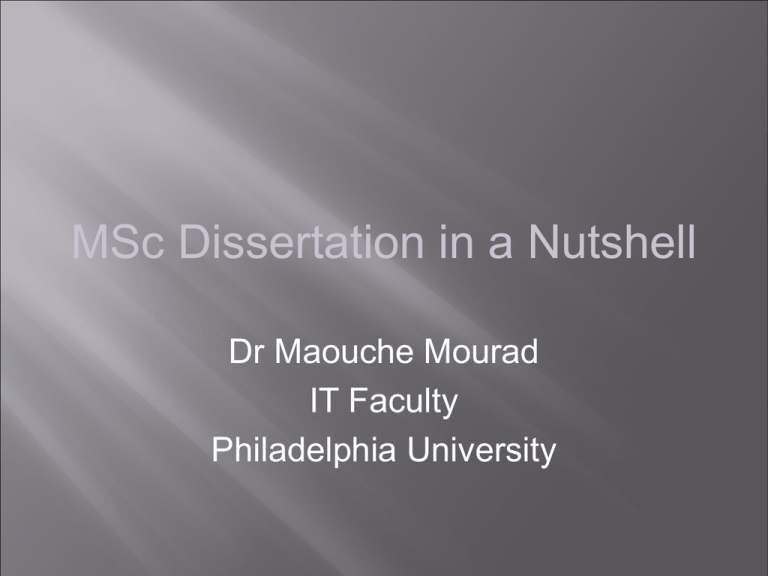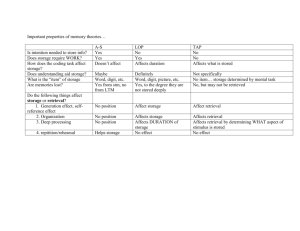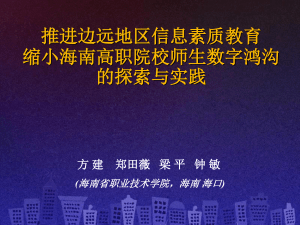MSc Dissertation in a Nutshell Dr Maouche Mourad IT Faculty Philadelphia University
advertisement

MSc Dissertation in a Nutshell Dr Maouche Mourad IT Faculty Philadelphia University Expected MSc Outcomes Some Research Related Issues MSc Dissertation Conduction Process Expected Contribution Conclusion 'Master' an addressed CS topic Initiate and conduct an effective scientific research activity Contribute (even Modestly) to extend and/or enrich CS knowledge: new facts, new artifacts..... 'A scientific and systematic search of pertinent information on a specific topic‘ [2] 'An original contribution to the existing stock of knowledge making for its advancement‘ [2] Theoretical versus Applied Qualitative versus Quantitative Conceptual versus Empirical Descriptive Find & Describe Facts, Situations (What?, Who?, When?) Exploratory Identify Patterns Analytical Explain Why? and How? Predictive Predict probable occurrence of particular events or behavior Problem Solving Build a solution to a problem Improve current practice Research Technique Research Method Research Methodology Formal Experiment Build Model Used in Theoretical Computer Science Verification of algorithms correctness Formal Semantics for divers kinds of language Formalization of CS concepts Model checking (system properties proof) Based on pure mathematics/logics (mathematical structures such algebra, set theory, category theory ) Conducting Experiments in order to evaluate existing or new solutions Real Experiments versus Simulated Experiments Design of Controlled Experiments: State properties to be validated Devise variables to be measured Statistical Analysis Build an artifact to demonstrate: Either the 'feasibility' of a concept (Proof of Concept) Or the improvement of existing solutions. Artifacts: Algorithm Method Construct Product ………… Requirements: Research Background ( solving a research Issue) Innovation Scientific Rigor Evaluation through relevant assessment criteria. Science Design Method: applied in Information Systems discipline Define an Abstract Model for a relevant phenomena under study Goal: Better Understanding Eventually conducting Experiments. Experiments on Models: Simulations Model checking (correctness of formal models) Carry out & Document a Literature Review State a well defined and motivated Goal to achieve Devise Research Questions Adopt Appropriate Research Approach and Method(s). Produce Results and Findings Validate & Evaluate Findings Reports Findings Objectives: - 'Master' a selected CS topic - Seek open research issues Requirements: - Focus on closest , related, similar works - Relevant - Rich - Up to Date Don’t behave like a "Free Electron" Be closer to a relevant Research Community Grasp an “In Progress” train Look for pertinent and relevant research issues Start from the stated Goal Derive a set of sub-goals that contribute to achieve the global Goal. Devise and Fine-tune a set of relevant, and accurate research questions Answers will help to achieve the sub-goals What? Why? How?..... Must be 'relatively' significant Must be Explicitly Emphasized Findings must be evaluated, validated or verified No previous/current answers available: Elaborate a 'working' solution or a 'correct' answer (even not the best one) Previous/ Current answers available: Improvement in terms of a relevant aspect: Performance Security Reliability ...... Previous/ Current answers available: Reduce constraints or assumptions imposed on current available answers Customize current answers to specific situations or cases. Add a new valuable feature not taken into consideration in current /previous answers. ............... A brief survey on some research related issues A presentation of some hints and advices on how to conduct a MSc Research Dissertation Missed Issues (but not less important): How to write literature review? How to write Dissertation? Research Goal "The research goal of the thesis is to enhance BP Model Repository technology for large business model collections in a relevant aspect that has received little attention so far“ [5] Sub-goal 1: Analyzing the state of the art of the BP Model Repository technology to identify an unsolved aspect, i.e., efficient process retrieval.[5] Sub-goal 2: Elaborating, implementing, and evaluating efficient process retrieval. .[5] Sub-goal 3: Evaluating the addition of efficient process retrieval to the state of the art of the BP Model Repository technology. .[5] The following questions are to be answered .[5] . Question 1: What functionality is supported by existing BP Model Repositories? Question 2: Why is efficient process retrieval the aspect to be enhanced? Question 3: What techniques have been proposed to perform process retrieval? Question 4: How to enhance the efficiency of process retrieval? Question 5: How to integrate the proposed technique with process retrieval? Question 6: How to implement a prototype for the proposed process retrieval techniques? Question 7: How to evaluate the efficiency of the proposed process retrieval techniques? Question 8: What is the contribution of the proposed techniques to the state of the art of BP Model Repository technology? 1. About Computing Science Research Methodology, Jose Nelson Amaral et al, webdocs.cs.ualberta.ca/~c603/readings/research-methods.pdf 2. Research Methodology: A Introduction, www.limat.org/data/research/Research%20Methodology.pdf 3. Scientific Research Methods and Computer Science Ricardo Freitas, MAP-I Seminars Workshop 2009 4. Research Methods: Quantitative and Qualitative Research Methods, Computer Science Department, Ryerson University (slides) 5. Business Process Model Repositories - EfficcientProcess Retrieval / Zhiqiang Yan. - Eindhoven: Technische Universiteit Eindhoven, 2012. - Proefschrift. (Master Dissertation)



